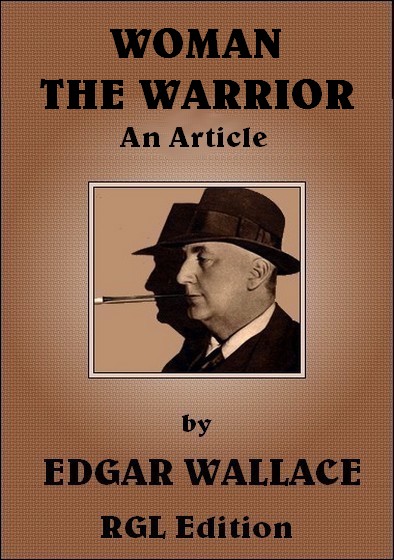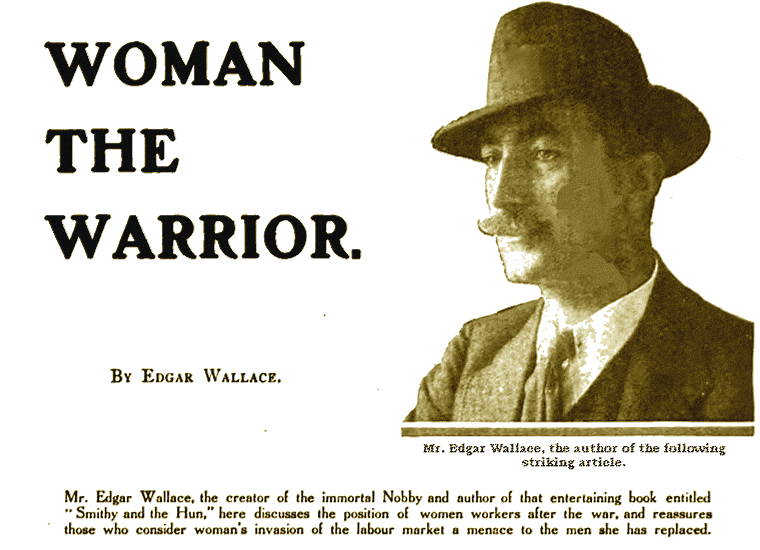
RGL e-Book Cover 2014©

RGL e-Book Cover 2014©

WOMAN the warrior has taken her place in the ranks of the great industrial army which, at the moment of writing, is helping to win the war for England and her Allies.
Her arrival on the scene is a cause for misgiving. Men she has replaced are speculating upon the possibilities of the future, not realising that Britain is in the position of a great factory which has always been understaffed, and that there are not sufficient men in the country for the adequate development of her industries.
The after-the-war difficulty will not be, how shall we find work for men, but, how shall we get the men we require?
Woman has already supplied half the answer to that question. She has made it abundantly clear that she can take certain jobs and release men not only for fighting with rifle and bayonet, but with lathe and machine in the war which is to follow the war.
If modern man is puzzled as to woman's future place in industry, how much more would be the ancient philosophers, if you could transport them from the spaces of immortality and engage their minds in the problem which is presented by the war woman and her future. Euripides saw his ideal in one who "remained quiet within the home." Socrates would have set his face most resolutelv against the modern war-worker, believing that her introduction into man's spheres would react to his disadvantage.
"Woman, once equal to man, becomes his superior," he said, and in the terms of equality he must have included her equality of opportunity.
England asks, and asks in all seriousness, what is to be the position of woman when the war is ended? Will she retire gracefully into the oblivion from whence she came? Will the neat 'bus-conductresses, the messenger-girls, the women ticket-collectors and inspectors, the lift-girls, and the like—will these go back to whatever was their task before the exigencies of war brought them to fill man's place?
The answer is "No."
The returned men will come against Woman the Warrior—woman, who, obeying the unerring instinct which every mother-heart holds, the instinct, not of self-preservation, but race-preservation, will oppose the return of men to jobs which women can fill. Not necessarily the women who are at present employed in work which the majority regard as temporary, but the army of women who will march along the path which these pioneers have cut.
Let this be remembered: that nothing so rouses the scorn of womankind as the spectacle of men filling women's jobs. There never was a woman who respected a shop-walker or counter-clerk. There never was a woman who did not regard a male domestic with contempt. The only domestic servants of a household that the educated woman ever met on anything like human terms were the groom or the chauffeur—because they were doing men's work, and work which was too heavy for a woman to perform.
Women require manliness in men. They demand the exhibition of strength or exceptional ingenuity. They have implanted in them the consciousness that life is a mental progression, and that mentality is, or should be, one of the most important weapons in man's equipment.
The woman comes to replace men who are either physically unfitted for manual labour, or were occupying positions which rendered it unnecessary for the job holders to employ their superior physical gifts. Those men, replaced by women, went into the Army or, in other words, went into physical training.
There is no reason why, at the end of the war, such men should revert to boy-jobs. There is no reason in the world why they should not be absorbed by the factories, which should be increased in number, and should be fully occupied in meeting the heavy demands consequent upon trade recovery after the war.
We need more than an army to fight—we shall need a great manufacturing army.
Germany exported to England alone enormous quantities of manufactured goods which will have to be made at home. She also exported these to Russia and to France —and we shall secure a portion of that trade.
A million pounds worth of motor chassis came from Germany—that million (or a greater part) will be spent in England. £300,000 extra will be paid in wages— 2000 or 3000 men must be found additional to those who were being employed before the war in motor-car manufacture. Women will largely replace the men who go into the factories. £3,000,000 worth of chemicals ; £700,000 worth of earthenware (the raw material came from Cornwall and Devon!); nearly £7,000,000 worth of soft goods, gloves, hosiery, lace, etc., came from Germany (here is employment for 20,000 or 30,000, mostly women); boots and shoes to the amount of £1,500,000; iron, steel, electrical goods, machinery, etc., £10,000,000 (20,000 to 30,000 extra workmen required).
How are we to obtain the skilled man labour to cope with the demand upon our industries which must inevitably follow the end of the war?
It must be drawn from those departments of industry which have hitherto attracted the unskilled labour.
New armies of mechanics mean new armies of clerks, messengers, and carriers. Our greatest problem will not be to oust woman, since woman, the warrior, is not to be ousted, but to persuade her to continue in the work which she is now performing.
I have been at some pains to discover the feelings of the women themselves upon this very important subject, and I append a few typical cases, showing the considerable difficulties which employers of labour will experience when the war is over.
Let it be remembered that there are few skilled machinists or engineers at the Front. They are included in the two million now engaged, in munition work. Let it be remembered, too, that their numbers must be considerably augmented, and that thousands of men who left boy-jobs will come back to men's work.
That is a point which I would very strongly emphasise. The lift-men, the messengers, the ticket-inspectors—who are amongst the poorest paid of workers—will find more lucrative employment elsewhere. The employer may be faced with the alternative of women or nothing. The present great army of women employed are merely the pioneers of woman labour in unusual occupations. From what I have been able to gather, they themselves regard their work as purely temporary and for the duration of the war only, and the majority do not seriously consider the possibility of continuing in their present occupations.
H.B., before the war was a waitress in a tea shop. She is now a conductress. After the war she will marry her "boy," who is now serving in France with a heavy gun detachment. She is not greatly enamoured of her present job, save that it gives her a certain authority which is pleasing.
H.M., before the war was a "bookkeeper"—a vague description which when worked out proved to be a cash-girl at a stationery shop. She is now working a Tube lift, and prefers the work. She likes the authority she possesses, which is in contrast to her previous position. After the war she hopes to marry and "settle down." She has no young man in France, but harbours the faith that "Mr. Right" will one day float into her orbit.
K.V., before the war was a shorthand typist (not a particularly good one, and probably only in the novice stage). She is now engaged in a munition shop, and "likes the life"—and the wages. She is married, and (during the war) her husband is in France. When he returns, she will not go out to business as her husband objects.
K.C., before the war a domestic servant (there are very few domestic servants to be met with, but this is probably due to the fact that the girls will not admit that occupation), now employed as conductress. Likes the work, but "too hard for a woman." Regards her profession as essentially a war-time product. After or during the war will marry a man now engaged in munition work.
S.J., before the war of no occupation, lived with her parents, now a conductress. Educated at Cheltenham. Advanced views on woman's place in the world. Young, and has no desire to continue working after the war. Gives her wages to a benevolent fund (for 'busmen).
M.A.O., before the war of no occupation. Soldier's widow. Has two children. Now employed as messenger. Likes the work, and especially cycling. Says she wishes to continue, "as it is only boys' work." Very intelligent girl, and holds the view that all boys should be compelled to serve an apprenticeship at some trade or other, but only for three years. After that, apprenticeship should be voluntary. This would give women such work as messengers, lift-boys, bell-boys, and booking-clerks do.
R.C., before the war a shorthand-typist and secretary, now in a railway ticket-office. She likes the work, but finds it very exacting. After the war she will marry.
I have conducted inquiries into some 150 cases, and these are the facts that
stand out:
It will be seen that few of these women regard their positions in the light of a permanency, and that is as it should be. The type of mind that looks upon a job which requires little skill and practically no strength as enjoying any permanence, is a singularly weak one, and is a source of weakness to the nation. The unskilled labour market should be stirred up at frequent intervals, and if women supplied the majority of workers in that market the stirring up would be more or less automatic.
The minds of the majority of women are fixed upon marriage, settlement, and domestic duties. Not two per cent, of the young women who go to work regard their career as permanent. It is rather the interregnum between school and marriage, an awkward interregnum, where their boundless energy, their youth, and their natural desire for a certain financial independence urge them to energetic action.
Roughly speaking, the average working life of a woman—and by working life I mean that period in which she is employed outside of her home—is about eight years. The average working life of a man is about thirty. For this reason alone there will always be a considerable shortage of woman labour, if employers decide, as they must decide, in retaining women in those posts for which the war has proved they are best fitted.
The decision, as it happens, does not rest entirely with employers. Woman herself has marked down the billets she can hold as creditably and as adequately as her male competitor. It is all to the good that she has arrived at such a decision, for without her we might find ourselves faced with the alternative of importing labour or restricting our output of manufactures.